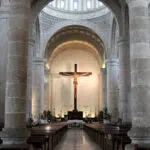Corpus Christi or The Feast of Corpus Christi is a Christian festival that is celebrated annually on the Thursday after Trinity Sunday, on June 4 this year. On this day, devout Christians gather together to honor the sacred body of Jesus Christ. The day is also known as Corpus Domini, which literally translates to ‘body and blood of Christ,’ while some also call it the Feast of Corpus Christi. Unlike other Christian festivals, Corpus Christi is celebrated uniquely in different cultures of the world. The most common way of celebrating the day is by consuming bread and wine — the symbols of the body and blood of Christ.
The Feast of Corpus Christi is also known as the Solemnity of the Most Holy Body and Blood of Christ, and the Church of England calls it the Day of Thanksgiving for the Institution of Holy Communion. In some places, celebrations include elaborate processions where Christians parade consecrated bread through the streets on paths decorated with flower wreaths. The Feast of Corpus Christi is a more joyous celebration after the solemn observance of Maundy Thursday.
History of Corpus Christi
Corpus Christi or the Feast of Corpus Christi is also known as the Solemnity of the Most Holy Body and Blood of Christ. This festival of the Roman Catholic Church honors the body of Jesus Christ in the Eucharist. The day is observed either on a Thursday or a Sunday following Trinity Sunday. It is a public holiday in many countries.
The Feast of Corpus Christi is one of the few feasts that lay people promoted in the past. It started in the 13th century with Juliana of Liège, a canoness from modern-day Belgium who yearned for a feast day outside of Lent to honor the Eucharist. After receiving several visions of Christ — visions that began when she was 16 — Juliana worked with a young monk named John of Lausanne to institute the feast day. She spent more than 40 years working towards achieving this goal. Together they composed an office by which they could celebrate the feast. They were successful, and their diocesan bishop approved the texts in 1246.
Pope Urban IV declared Corpus Christi a feast day on August 11, 1264. Corpus Christi spread to nearby cities and towns, growing in popularity thanks to the efforts of Eva of Liège. Eva was an anchoress who continued Juliana’s work after her death. Ironically, Urban IV’s successors did not uphold his decree, and they suspended the festival. In 1311, Pope Clement IV reinstated the feast at the Council of Vienne.
The holiday is more likely to be implemented by the Catholic Church rather than government bodies. However, the day, sometimes also known as Holy Thursday, is widely accepted as a day of celebration. Every region in the world has its own way of celebrating Corpus Christi but consumption of wine and bread is mandatory. It was only in the 15th century that Corpus Christi became one of the principal feasts of the church. In Catholic religions, the festival is observed with a street procession and pageant, usually organized near the parish. The chief priests lead the mass and devotees gather in churches to pray and sing hymns.
Early Eucharistic festivals were glamorous affairs involving entire towns and cities. Sovereigns and nobles in European Catholic monarchies participated in the celebrations, accompanied by court officials and military officers. Commoners knelt outside their homes as these grand processions walked by. In modern times, Pope John Paul II led annual parades on the feast day, moving from St. Peter’s Square in the Vatican and through the streets of Rome. The Feast of Corpus Christi remains one of the essential celebrations underscoring the fundamental tenets of Christianity and Catholicism.
Contrary to popular belief, Corpus Christi is not just a Catholic festival but also celebrated in some Anglican and Lutheran Churches. These churches have a very different way of celebrating as compared to their Catholic counterparts. Anglican and Lutheran Churches do not have street processions and the celebrations are mostly restricted to church events. Protestants don’t typically celebrate the day. In most cultures, the Holy Communion is also an important part of the festival.
Corpus Christi timeline
Jesus is born in Bethlehem to his parents, Mary and Joseph.
She describes her first vision of Christ, in which she is ordered to petition for the establishment of the Corpus Christi feast.
Robert de Torote, bishop of Liège, institutes the first Corpus Christi Holiday.
Jacques Pantaléon, aka Pope Urban IV, orders the church to hold its first Feast of Corpus Christi.
The festival becomes generally accepted among Roman Catholics in the 14th century.
The Council of Trent declares that Christians must publicly honor Christ in the Holy Eucharist.
It is only in the 15th century that Corpus Christi becomes one of the principal feasts of the church.
Corpus Christi FAQs
What is celebrated on Corpus Christi?
The festival of Corpus Christi celebrates the Eucharist as the body of Christ.
Is Corpus Christi a religious holiday?
Yes, in largely Catholic countries, Corpus Christi is a religious holiday.
What is the meaning of Corpus Domini?
Corpus Domini is another name for Corpus Christi.
Why is Corpus Christi on a Thursday?
In the original General Roman Calendar, Corpus Christi was celebrated on the Thursday after Trinity Sunday.
What countries celebrate Corpus Christi?
Corpus Christi is a public holiday in some countries with a predominantly Catholic population, including, among others, Argentina, Haiti, parts of Bosnia and Herzegovina, Brazil, Colombia, Austria, Croatia, Bolivia, Dominican Republic, and East Timor.
What color do you wear for Corpus Christi?
In the Catholic church tradition, the colors white and purple represent Corpus Christi. White signifies purity or liberation from sin.
How to celebrate Corpus Christi
Attend a street procession
Most parishes organize a street procession on Corpus Christi. It’s a good way to get together with the community while enjoying the sights and sounds of the festival. A Corpus Christi parade is worth attending even if you’re not a Christian. Some processions involve the parading of consecrated bread through the streets.
Take Holy Communion
Receiving Holy Communion on this day is mandatory for Catholics. It represents Christ's body.
Reconnect with your faith
Religious holidays celebrate the power of belief. It’s an excellent opportunity to partake in religious activity and nourish your soul.
5 Important Facts About Corpus Christi
The Spanish have a special name for it
In Seville, Spain, the festival is also known as the ‘Thursday that shines brighter than the sun.’
The English keep it intimate
While Corpus Christi is celebrated with exuberance in most countries, churches in the U.K. have a quiet celebration on the day.
Sacred flour
Corpus Christi symbols include an image of sanctified bread and a chalice representing the Eucharist, a ciborium and an altar, and a cup with an arched cover.
The first papal-sanctioned universal feast
The Feast of Corpus Christi was the first papally sanctioned universal feast in the Latin Rites.
Also commemorates the Eucharist
The day not only honors Christ’s holy body but properly commemorates the institution of the Eucharist.
Why we love Corpus Christi
It is an important Christian holiday
Corpus Christi honors the body of Christ. The bread and wine symbols in Christianity refer to Christ’s flesh and blood. As Pope Francis said, Corpus Christi gives us the “joy of celebrating and praising Christ… expressing our gratitude for nourishing us with love through the Sacrament of his Body and Blood.” We give collective thanks to God for Christ’s abiding presence within us on this day. Participating in the sacrifice of the Holy Eucharist is an act of great theological significance. Celebrating the feast strengthens our charity and unity with Christ by jointly offering his Body and Blood to the Father. We get to worship the Father, Son, and Holy Spirit perfectly. We are reminded to make sacrifices for our loved ones as Jesus did for us.
Expressing gratitude to Christ
As Pope Francis said, Corpus Christi gives us the “joy of celebrating and praising Christ… expressing our gratitude for nourishing us with love through the Sacrament of his Body and Blood.” We give collective thanks to God for Christ’s abiding presence within us on this day.
A day of festivities
Street processions, priests dressing up in fancy robes, and pageants are a common sight on Corpus Christi. Everyone looks forward to this day of festivities and merrymaking. The Feast of Corpus Christi comes after Maundy Thursday. This period marks the washing of disciples’ feet, the institution of the priesthood, and the events of the Garden of Gethsemane, while Corpus Christi focuses on the Last Supper. It’s a happier holiday of joyous celebration, not solemn meditation.
Corpus Christi dates
| Year | Date | Day |
|---|---|---|
| 2024 | May 30 | Thursday |
| 2025 | June 19 | Thursday |
| 2026 | June 4 | Thursday |


















